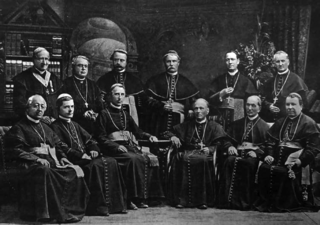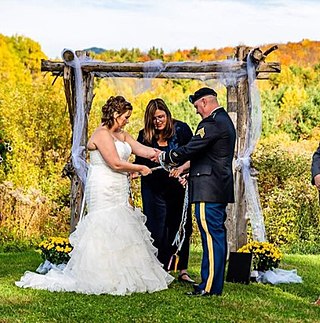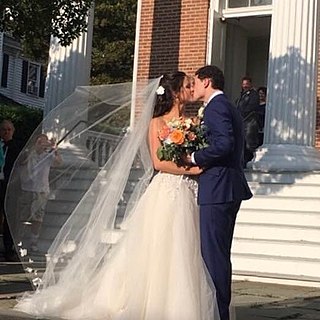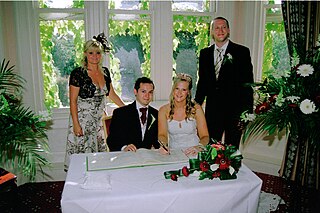
A wedding is a ceremony where two people are united in marriage. Wedding traditions and customs vary greatly between cultures, ethnic groups, races, religions, denominations, countries, social classes, and sexual orientations. Most wedding ceremonies involve an exchange of marriage vows by a couple, presentation of a gift, and a public proclamation of marriage by an authority figure or celebrant. Special wedding garments are often worn, and the ceremony is sometimes followed by a wedding reception. Music, poetry, prayers, or readings from religious texts or literature are also commonly incorporated into the ceremony, as well as superstitious customs.

Clergy are formal leaders within established religions. Their roles and functions vary in different religious traditions, but usually involve presiding over specific rituals and teaching their religion's doctrines and practices. Some of the terms used for individual clergy are clergyman, clergywoman, clergyperson, churchman, cleric, ecclesiastic, and vicegerent while clerk in holy orders has a long history but is rarely used.

A civil marriage is a marriage performed, recorded, and recognized by a government official. Such a marriage may be performed by a religious body and recognized by the state, or it may be entirely secular.
A marriage license is a document issued, either by a religious organization or state authority, authorizing a couple to marry. The procedure for obtaining a license varies between jurisdictions, and has changed over time. Marriage licenses began to be issued in the Middle Ages, to permit a marriage which would otherwise be illegal.
Quaker weddings are the traditional ceremony of marriage within the Religious Society of Friends. Quaker weddings are conducted in a similar fashion to regular Quaker meetings for worship, primarily in silence and without an officiant or a rigid program of events, and therefore differ greatly from traditional Western weddings.

Marriage is available in England and Wales to both opposite-sex and same-sex couples and is legally recognised in the forms of both civil and religious marriage. Marriage laws have historically evolved separately from marriage laws in other jurisdictions in the United Kingdom. There is a distinction between religious marriages, conducted by an authorised religious celebrant, and civil marriages, conducted by a state registrar. The legal minimum age to enter into a marriage in England and Wales is 18 since 27 February 2023. Previously the minimum age of marriage was 16, with parental permission. This also applies to civil partnerships.

Humanist Society Scotland is a Scottish registered charity that promotes humanist views and offers humanist wedding, funeral, and baby-naming ceremonies. It is a member of the European Humanist Federation and Humanists International.

An officiant or celebrant is someone who officiates at a religious or secular service or ceremony, such as marriage, burial, namegiving or baptism.

In Australia, celebrants or civil celebrants are people who conduct formal ceremonies in the community, particularly weddings – which represent the main ceremony of legal import conducted by celebrants –, and for this reason are often referred to as marriage celebrants. They may also conduct extra-legal ceremonies such as naming of babies, renewal of wedding vows, funerals, divorces, becoming a teenager, changing name, significant birthdays, retirements, and other life milestones. Officiating at a marriage requires that the celebrant be an authorised marriage celebrant under Australian law, or the law where the marriage takes place, but officiating at non-legal ceremonies does not.

A humanist celebrant or humanist officiant is a person who performs humanist celebrancy services, such as non-religious weddings, funerals, child namings, coming of age ceremonies and other rituals. Some humanist celebrants are accredited by humanist organisations, such as Humanists UK, Humanist Society Scotland (HSS), The Humanist Society (US), and the Humanist Association of Canada (HAC).

Celebrancy is a profession founded in Australia in 1973 by the then Australian attorney-general Lionel Murphy. The aim of the celebrancy program was to authorise persons to officiate at secular ceremonies of substance, meaning and dignity mainly for non-church people. Up until this point legal marriages were reserved only to clergy or officers of the Births, Deaths & Marriages registry office. These appointed persons, referred to in the Marriage Act of Australia as "authorised celebrants", create & conduct weddings, funerals, namings, house dedications, coming of age and other life ceremonies for those who do not wish to be married or have other ceremonies in a church or registry office.
A self-uniting marriage is one in which the couple are married without the presence of a third-party officiant. Although non-denominational, this method of getting married is sometimes referred to as a "Quaker marriage", after the marriage practice of the Religious Society of Friends, for which see Quaker wedding.
Same-sex marriage in Judaism has been a subject of debate within Jewish denominations. The traditional view among Jews is to regard same-sex relationships as categorically forbidden by the Torah. This remains the current view of Orthodox Judaism.

In Belgium, organized secularism is the local associations and organizations which provide moral support for naturalist, atheist, agnostic, secular humanist, freethinking, Bright, or irreligious and non-confessional citizens. A person who subscribes to such entities or ideologies, or at least espouses an interest in "free inquiry" apart from religious traditions is described as a "secular" or "free-thinker".

Marriage in New Zealand is governed by an Act of Parliament. The minimum marriage age is 18 years, or 16 years with consent of the Family Court. Polygamous marriages are not permitted in New Zealand. There are prohibitions of marriages between some relatives and some who are already in a civil union.
An ordination mill is a religious organization or denomination in which membership is obtainable by trivial means and all members are qualified for self-ordination as a minister of religion, bishop, priest or deacon without any prerequisite training, work, experience, seminary study or other qualification. In some cases, ordination may be obtained online or by mail merely by submitting an application and a nominal fee.

A civil funeral celebrant is a person who officiates at funerals which are not closely connected with religious beliefs and practises. They are analogous to civil celebrants for marriage ceremonies. Civil celebrant funerals began in Australia in 1975. As secular (civil) wedding ceremonies became accepted, first in Australia and then in other Western countries, a similar process for funerals has since been established in New Zealand, the United Kingdom, Canada and the United States. Civil funeral celebrants are often also civil marriage ceremony celebrants.

A civil, or registrar, ceremony is a non-religious legal marriage ceremony performed by a government official or functionary. In the United Kingdom, this person is typically called a registrar. In the United States, civil ceremonies may be performed by town, city, or county clerks, judges or justices of the peace, or others possessing the legal authority to support the marriage as the wedding officiant.

The legal status of the Universal Life Church encompasses a collection of court decisions and state executive branch pronouncements determining what rights the Universal Life Church (ULC) and comparable organizations have as religious organizations.














